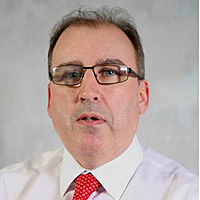Biography
I first came to Keele in 1981 as an undergraduate student studying Geography and Geology. The Dual Honours system at Keele provided an ideal opportunity to develop my interests in both of these geoscience subjects. In 1985, I progressed to a PhD entitled ‘Rheological, Thermal and Isostatic Constraints on Continental Lithosphere Extension and Compression’ supervised by Professor Nick Kusznir at the University of Liverpool.
It was through this project that I developed research interests in the numerical and computer modelling of geological processes; a theme that dominates my research activities to the present day. After a brief spell in the IT industry, I was appointed as a lecturer in Geology at Keele in 1989 and since then have taught a broad range of class and field- based geoscience courses from Foundation Year to Masters level.
Research and scholarship

I have developed two- and three-dimensional numerical models, which include a number of geological and geodynamic processes, in order to simulate the evolution of mountain belts and basin structures within a variety of tectonic regimes. These modelling techniques, combined with study of subsurface and field data, have provided new insights into the mechanisms that have contributed to the geological evolution of a number of case studies within the geological record, including the northern North Sea, the Laramide Province (Wyoming, western USA), the Black Sea and South Caspian Basin.
I am a member of the Basin Dynamics Research Group and I am a Fellow of the Geological Society of London and hold both Chartered Geologist and European Geologist status.
Teaching
Year 1:
- ESC-10034: Geology: Time and Space
- ESC-10045: Introductory Geology for Environmental Scientists
- ESC-10047: Geoscience Data Interpretation, Analysis and Visualisation (Module Coordinator)
- ESC-10048: The Earth System (Module Coordinator)
Year 2:
- ESC-20036: Palaeoclimatology and Quaternary Studies (Module Coordinator)
- ESC-20039: Advanced Structural Geology and Geological Mapping Training
Year 3:
- ESC-30008: Structure and Geodynamics (Module Coordinator)
- ESC-30039: Independent Field Project
- ESC-30028: Economic Geology
- ESC-30032: Geoscience Independent Field Project
Year 4 (MGeoscience):
- ESC-40003: Literature Synthesis and Presentation Skills (Module Coordinator)
- ESC-40004/5/6: MGeoscience Research Project
Publications
PGR/PGT Students
Current PhD students
L. Al-Madhachi. PhD Thesis title: The Cretaceous reservoir evolution of the south east Mesopotamian Basin, south-eastern: Geological Modelling evaluation.
Stuart Campbell. PhD Title: Unconventional and geothermal energy resources within the Main Karoo Basin, South Africa
Louis Howell. PhD Thesis title: Structural, stratigraphic and geodynamic controls on the evolution of the Carboniferous succession of northern England and southern Scotland.
Past PhD students
Linda Austin. 2014. The geological and geodynamic evolution of the Northumberland Trough Region: insights from numerical modelling. Unpublished PhD Thesis, Keele University.
Rose Smithells. 2014. A comparison of the geological, geodynamic and rheological evolution of the northern and southern Rockall Trough : a numerical modelling approach. Unpublished PhD Thesis, Keele University.
PGT Students
Liam Hartley. 2017. Using LiDAR data for geological mapping and outcrop analysis: application to the Watchet area, SW England. Unpublished MSc Thesis, Keele University.
Rob Stewart. 2016. 2D structural, isostatic, thermal and stratigraphic modelling of lithosphere extension: insights into the mechanisms controlling basin subsidence/uplift and magma generation. Unpublished MSc Thesis, Keele University.
Ross Field. 2015. Numerical modelling of lithosphere extension: Its application to the North-East Atlantic Region. Unpublished MSc Thesis, Keele University.
School of Geography, Geology and the Environment
William Smith Building
Keele University
Staffordshire
ST5 5BG
Tel: +44 (0) 1782 733615
School email: gge@keele.ac.uk


